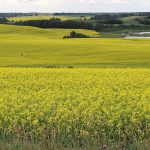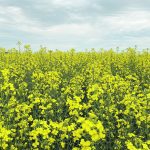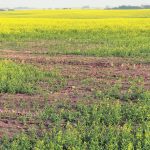
May contract talks alarm sugar beet growers
Lack of progress means time is growing short to get a successfull crop into the ground in Southern Alberta

Former Agriculture Minister Charlie Mayer dead at 89
Mayer fought for Canadian wheat nationally and internationally

China announces retaliatory tariffs on Canadian canola oil, peas and pork

Find your agriculture news during the mail strike

Trump victory puts spotlight on trade

Study finds alkaline soil promotes soil fungus
Alberta researchers determine that verticillium stripe is more severe in canola growing regions where pH is 7.4 to 8.6
WINNIPEG — Verticillium stripe is a more common and troublesome disease for canola growers on the eastern half of the Prairies, particularly in Manitoba. Meanwhile, verticillium isn’t a huge issue in Alberta. There may be a simple reason for this geographic variation — soil pH. Researchers at the University of Alberta have learned that Verticillium […] Read moreAlberta farmers nearly ready to wrap up another harvest
Province’s sugar beet crop is the least advanced, but other crops, such as wheat and canola, are almost all in the bin
Harvest operations in Alberta are virtually complete, the province’s most recent crop report said. Combining advanced three points to 99 per cent finished as of Oct. 22 as well as being three points above the five-year average. The province’s south, central and Peace regions wrapped up their harvests, while the northeast and northwest reached 97 […] Read more
Canada’s war brides are the world war’s happy ending

Weather called biggest ‘yield robber’ this year
Too much rain and heat on many parts of the Prairies caught canola at vulnerable stages, reducing yields
The biggest “yield robber” of canola on the Prairies turned out to be the weather, says an authority on the subject. Although periodic heavy rainfall compounded the emergence of diseases and predatory insects, disagreeable weather caused considerable damage all on its own. Both the western and eastern Prairies received extreme weather that weakened canola production […] Read more
Study aims for finishing benchmarks
Feedlot and backgrounding sectors called to participate in a two-part project that looks for insight on finishing practices
If you’re a feedlot or backgrounding operation manager with an hour to spare, a group of Canadian researchers wants your help. The team behind the Canadian Feedlot Benchmark Study says their survey, now under way, will help create a national benchmark database of backgrounding and finishing practices used in herds across Canada. The stated goal […] Read more




